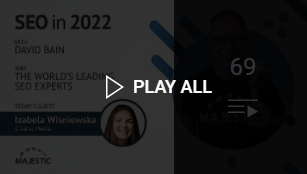-
Site Explorer
- Majestic
- Summary
- Ref Domains
- Backlinks
 New
New Lost
Lost- Context
- Anchor Text
- Pages
- Topics
- Link Graph
- Related Sites
- Advanced Tools
- Author ExplorerBeta
- Summary
- Similar Profiles
- Profile Backlinks
- Attributions
- Compare
-
Link Tools
- My Majestic
- Recent Activity
- Reports
- Campaigns
- Verified Domains
- OpenApps
- API Keys
- Keywords
- Keyword Generator
- Keyword Checker
- Search Explorer
- Link Tools
- Bulk Backlinks
- Neighbourhood Checker
- Submit URLs
- Experimental
- Index Merger
- Link Profile Fight
- Mutual Links
- Solo Links
- PDF Report
- Typo Domain
- Free SEO Tools
-
Support
- Blog

- Support
- Get started
- Tools
- Subscriptions & Billing
- FAQs
- Glossary
- How To Videos
- API Reference Guide

- Contact Us
- About Backlinks and SEO
- SEO in 2024
- Link Building Guides
- Webinars
- Blog
SuperGAP analysis: Using your competitor's rankings to guide your SEO success
Lukasz Zelezny
Lukasz reveals that he uses his competitors' rankings to identify and select his own target keyword phrases.

SuperGAP analysis: Using your competitor's rankings to guide your SEO success
Lukasz says: "My analysis is called SuperGAP because I use a super high number of competitors, often between 20 and 40 depending on how much memory my local machine has. I use Excel and data sources like Semrush, and export the rankings of the competitors to build a matrix of all the keywords the competitors are simultaneously ranking for, and my client is not. As competitors are players of the same industry, this gives me a perfect view of the areas where my client is not ranking and should be doing so."
How do you get started with this? Do you have to define a list of keyword phrases to begin with?
"When my clients are onboarding, I send them a form where they can add anyone they consider to be a competitor. If they struggle to provide many competitors, I use metrics to find the most similar websites to my client's site, such as the number of their ranking keywords that overlap with my clients'. The websites can't be ranking on too few or too many keywords. If there are only a few keywords, often the competitor will be not relevant, and it will not be a competitor. If it's too many, you are probably talking about Wikipedia or Amazon. Every eCommerce may say at some level that Amazon is a competitor - but this is not the type of website we're looking for.
You're looking for a website of similar size, traffic, and number of keywords that rank. Semrush provides a metric which measures the similarity of the keyword set. It provides all the keywords that competitor A is ranking for versus your client and all the keywords that competitor B is ranking for versus your client. This shows you what the similarity level is. The higher the similarity level, the better - as long as the other metrics also makes sense."
How do you ensure that you don't get keyword recommendations that are irrelevant for your client? Could this happen if your competitors have additional lines of business that your client doesn't operate in?
"The outcome of the SuperGAP is just a final suggestion that needs to be digested by an in-house team. You know that there are other areas which your client is not interested, so when the gap analysis is prepared, you can work through the list with the client and exclude all these areas until you hit your sweet spot. SuperGap analysis is so powerful that I can do keyword research for a Russian website written in Cyrillic and provide relevant topics for a Chinese website. You don't need to know the language or the alphabet because you're using numbers.
Often, after I've presented the gap analysis to clients, there is a 'Wow' moment when they see the highest priority keywords. They can't believe they are not ranking for them and have to check on Google. This is that moment you know you've done a great job as a consultant, and provided very relevant research for your client."
So, you're delivering such accurate information and appropriate recommendations to your clients because you're selecting a high number of competitors. Have you determined that you need to find at least 20 competitors to achieve this level of precision?
"That's correct. Normally software only allows analysis of five competitors, but I use many more. I'm currently analysing 35 competitors of a client who provides golf equipment, and they are ranking most highly for keywords such as 'How much does a golf simulator cost?' That means my client needs to provide advice on this. Maybe they should start selling simulators, because it's definitely something that resonates highly with their potential customers.
You're getting super deep knowledge about the industry, and this is also very valuable information for eCommerce websites. It can show you which products need more marketing, or even which products they should consider selling. You can do gap analysis to understand why your competition is doing so well. If they are predominantly selling men's clothing, you can see they are now also doing women's clothing to inflate traffic. Do they want to follow this path? If yes, you know what products they need to upload. If not, you can dig deeper."
Are there certain types of business or website sizes that SuperGAP analysis is not appropriate for?
"The only exception to using this gap analysis would be highly B2B websites, such as the petroleum industry. This is not because the methodology is bad, it's more due to the behaviour of potential customers. It's very rare that someone decides that today they're going to dig a shaft and search to find out who can help them. The purchase process is much longer and very complicated.
Every small, medium and large company can grow - as can the industry leaders. There are always areas where you are not ranking. I use three metrics in my gap analysis. Firstly, 'match' - which is the number of competitors that simultaneously rank. Secondly, 'average' - which is the average ranking of competitors. Thirdly, 'prioritisation' - which is a special formula used to aggregate everything, including cost per click. Despite the fact we're talking about SEO here, this is important because a higher cost per click means the keyword has more commercial benefit.
When I've aggregating this, I sort by 'match' and then 'priority'. The keywords that are most visible across competitors are always on the top of the list. Of course, my clients might decide they don't want to go for specific keywords, and that's fine. This is the role of the consultant. This is the moment when you can marry the knowledge of external SEO expertise and in-house know-how about the company and the industry."
How often should an SEO be doing this? Is it only done at the start of a client project, annually, or more often than that?
"I recommend doing this every three to six months. You don't want to have a situation where you're bombarding in-house people with new gap analysis every two weeks. The other determining factor is when they can actually execute the findings from the gap analysis. I do this analysis during the client audit, and they are getting the peak benefits for the next three to six months.
There is one key step in my analysis I haven't mentioned that makes things a lot easier. At the end, when I'm left with 100,000 keywords in my spreadsheet, I only choose the keywords which have at least three competitors ranking for them and 100 searches a month. The list is suddenly reduced to 5,000 records.
Previously at this stage, I had to manually group these keywords into what would constitute a landing page, blog post, or category for eCommerce. Now there is a software, SE Ranking, which has a tool called Grouper. The problem is this tool is pay-as-you-go, so every keyword costs a very small amount. If you're going with 5,000 keywords, it will be an additional cost to the audit - but it's worth it. You know that you are only loading keywords that are very prominent in delivering extra traffic to your client. Let the tool start grouping, and it looks at the Google search results to identify keywords that return the same URLs multiple times, which is a strong signal that multiple keywords should belong to the same page. You end up with a beautiful spreadsheet with grouped keywords' search volumes. Send this to the content writers, and they can deliver amazing content."
Is optimising existing pages one of the biggest initial wins after you've provided this information to your clients?
"Gap analysis is predominantly for writing new pages. 99% of the time, it's used to design and create new content to expand on the existing number of pages.
I have another pillar in my audit, which is Snapshot. Here, I take the keywords that are already ranking from the Search Console using an API. I can have about 400,000 keywords and then identify 5-10 keywords per URL that are ranking quite well but are not yet first. Then you optimise this in-house. It can be a very long process, especially if you have a lot of content, but it's very beneficial."
What's one thing an SEO needs to stop doing to spend more time on SuperGAP analysis?
"Firstly, in-house people need to remember that to scale up, they need to outsource. They can outsource all the menial tasks, and that will give them much more power.
The second problem I see is too much writing for writing's sake - and no one measures what value it brings. You may have articles that are not even generating traffic, let alone leads or conversions. Nobody's searching for terms like, 'Top 100 things you should see in Budapest this week' anymore. Instead, people are searching with a problem focus for phrases such as, 'Where should I go for a holiday during lockdown'. Now, you need to get to the point. People are using Google because they have a problem, and they want to find the solution. It's your job to give them that solution."
You can find Lukasz Zelezny over at SEO.London.
Choose Your Own Learning Style
 Video
Video
If you like to get up-close with your favourite SEO experts, these one-to-one interviews might just be for you.
Watch all of our episodes, FREE, on our dedicated SEO in 2022 playlist.
 Podcast
Podcast
Maybe you are more of a listener than a watcher, or prefer to learn while you commute.
SEO in 2022 is available now via all the usual podcast platforms
Don't miss out
Opt-in to receive email updates.
It's the fastest way to find out more about SEO in 2025.
Could we improve this page for you? Please tell us





